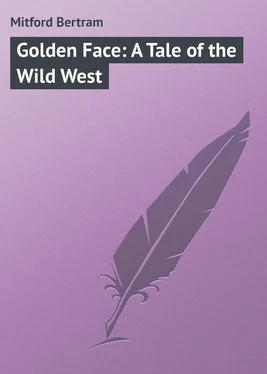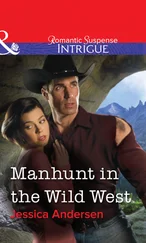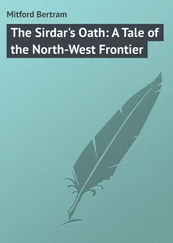Bertram Mitford - Golden Face - A Tale of the Wild West
Здесь есть возможность читать онлайн «Bertram Mitford - Golden Face - A Tale of the Wild West» — ознакомительный отрывок электронной книги совершенно бесплатно, а после прочтения отрывка купить полную версию. В некоторых случаях можно слушать аудио, скачать через торрент в формате fb2 и присутствует краткое содержание. Жанр: foreign_prose, на английском языке. Описание произведения, (предисловие) а так же отзывы посетителей доступны на портале библиотеки ЛибКат.
- Название:Golden Face: A Tale of the Wild West
- Автор:
- Жанр:
- Год:неизвестен
- ISBN:нет данных
- Рейтинг книги:4 / 5. Голосов: 1
-
Избранное:Добавить в избранное
- Отзывы:
-
Ваша оценка:
- 80
- 1
- 2
- 3
- 4
- 5
Golden Face: A Tale of the Wild West: краткое содержание, описание и аннотация
Предлагаем к чтению аннотацию, описание, краткое содержание или предисловие (зависит от того, что написал сам автор книги «Golden Face: A Tale of the Wild West»). Если вы не нашли необходимую информацию о книге — напишите в комментариях, мы постараемся отыскать её.
Golden Face: A Tale of the Wild West — читать онлайн ознакомительный отрывок
Ниже представлен текст книги, разбитый по страницам. Система сохранения места последней прочитанной страницы, позволяет с удобством читать онлайн бесплатно книгу «Golden Face: A Tale of the Wild West», без необходимости каждый раз заново искать на чём Вы остановились. Поставьте закладку, и сможете в любой момент перейти на страницу, на которой закончили чтение.
Интервал:
Закладка:
Then the crowd outside parts decorously, giving passage to those whose weight and standing entitle them to a seat within the sacred lodge, and a voice in the council. Stately chieftains arrayed in their most brilliant war-costumes – the magnificent war-bonnets of eagles’ plumes cresting their heads and flowing almost to the ground behind, adding an indescribably martial and dignified air to their splendid stature and erect carriage – advance with grave and solemn step to the council fire and take their seats, speaking not a word, and looking neither to the right nor to the left Partisans, or warriors of tried skill and daring, who, without the rank and following of chiefs, are frequently elected to lead an expedition on the war-path, these, too, in equally splendid array, have a place in the assembly; after them, lesser braves, until the lodge can hold no more. The crowd must listen to what it can of the debates from without.
From the standpoint of their compatriots, some of these warriors are very distinguished men indeed. There is Long Bull, and Mountain Cat, and Crow-Scalper, all implacable and redoubted foes of the whites. There is Burnt Wrist, and Spotted Tail, and Lone Panther, and a dozen other notable chiefs. Last, but not least, there is Red Cloud, orator, statesman, and seer, the war-chief of the Ogallalla clan, and medicine chief virtually of the whole Sioux nation.
The flames of the council fire leap and crackle, casting a lurid glow on the stern visages of the assembled warriors. Many of these wear brilliantly-coloured tunics of cloth or dressed buckskin, more or less tastefully adorned with beadwork or shining silver plates. Over this, carelessly thrown, or gracefully dangling from its wearer’s shoulder, is the outer “robe” of soft buffalo hide, blazoned all over with hieroglyphics and pictures setting forth the owner’s feats of arms or prowess in the chase, and among the scalp-locks fringeing tunics and leggings may be descried not a few that originally grew upon Anglo-Saxon heads. But all is in harmony, tasteful, barbarically picturesque; and the air of self-possessed dignity stamped upon the countenances of these plumed and stately warriors could not be surpassed by the most august assembly that ever swayed the affairs of old civilisation.
One more personage is there whom we have omitted to mention. Leaning against a lodge pole, as thoroughly unconcerned and at his ease among the red chieftains as ever he was in Belgravian boudoir, his splendid face as impassive as their own, sits Rupert Vipan, and if ever man lived who was thoroughly calculated to inspire respect in the breasts of these warlike savages, assuredly he was that man. That he is here at all is sufficient to show in what honour he is held among his barbarian entertainers.
And now in order to render more clearly the drift of the subsequent debate, some slight digression may here be necessary.
The Sioux, or Dahcotah, as they prefer to be called, are about the only aboriginal race in North America whose numbers and prowess entitle them to rank as a nation. They are sub-divided into clans or tribes: Ogallalla, Minneconjou, Uncpapa, Brulé, and many more, with the specification of which we need not weary the reader, but all more or less independent of each other, and acting under their own chiefs or not, as they choose. At the time of our story the whole of these, numbering about 60,000 souls, occupied a large tract comprising the south-western half of the territory of Dakota, together with the adjacent extensive range in eastern Montana and Wyoming, watered by the Yellowstone and Powder Rivers and their tributaries, and commonly called after the last-named stream. On the border-line of Dakota and Wyoming, and therefore within the Indian reservation, stand the Black Hills, a rugged mountain group rising nearly 8,000 feet above the sea level, an insight into whose wild and romantic fastnesses we have already given.
At that period popular rumour credited the Black Hills with concealed wealth to a fabulous extent. Gold had already been found there, not in any great quantities, but still it had been found, and the nature and formation of the soil pointed to its existence in vast veins, at least so said popular rumour. That was enough. Men began to flock to this new Eldorado. Parties of prospectors and miners found their way to its sequestered valleys, and soon the rocks rang to the sound of the pick, and the mountain streams which gurgled through its savage solitudes were fouled with the washing of panned dirt.
But the miners had two factors to reckon with – the Government and the Indians. The former was bound by treaty to keep white men, particularly miners, out of the Indian reservation; the latter became more and more discontented over the non-fulfilment of the agreement. The shrewd tribesmen knew that gold was even a greater enemy to their race than rum. The discovery of gold meant an incursion of whites; first a few, then thousands; cities, towns, machinery. Then good-bye to the game, whereby they largely subsisted; good-bye, indeed, to the country itself, as far as they were concerned. They threatened war.
It became necessary for something to be done. Troops were sent to patrol the Black Hills, with strict injunctions to arrest all white men and send them under guard to the settlements. This was extensively done. But the expelled miners, watching their chance, lost no time in slipping back again, and their numbers, so far from decreasing, had just the opposite tendency, arrests notwithstanding.
Then the United States Government resolved to purchase the Black Hills, and made overtures to the Sioux accordingly. The latter were divided in opinion. Some were for terms, the only question being as to their liberality; others were for rejecting the proposal at any price, and if the Government still persisted in its neglect to keep out the white intruders, why then they must take the defence of their rights into their own hands.
Pause, O philanthropic reader, ere running away with the idea that these poor savages’ rights were being ruthlessly trampled on; and remember the old legal maxim about coming into court with clean hands. The Government tried to do its best, but in a vast, rugged, and lawless country the inhabitants are not to be policed as in a well-ordered city of the Old World. Men could not be hung merely for encroaching on the reservation, and the state of popular feeling precluded any sort of deterrent punishment. And then, were the Indians themselves strictly observing their side of the treaty? Let us see.
For several summers the bands roaming in the Powder River country had perpetrated not a few murders of whites, had run off stock and destroyed property to a considerable extent, in short, had taken the war-path, and this although nominally at peace. Now it was by virtue of keeping the peace that their exclusive rights over the encroached-upon territory had been conceded.
We have said that the Sioux were made up of various sub-divisions or clans. Now at that time there was not one of these which did not furnish a quota of warriors to swell the ranks of the hostiles. Nominally at peace, and drawing rations from the Government, the turbulent spirits of these tribes would slip away quietly in small parties, to join the hostile chiefs for a summer raid, returning to the agencies when they had had enough fighting and plunder, and becoming – in popular parlance – “good Indians” again. These escapades were either winked at by the tribal chiefs, who remained quietly at the agencies, “keeping in” with the Government, or were simply beyond their power to prevent. Probably both attitudes held good, for the control exercised by an Indian chief over his band or tribe seldom amounts to more than moral suasion.
Briefly, then, the Sioux and their allies, the Northern Cheyennes, might be thus classified: —
Читать дальшеИнтервал:
Закладка:
Похожие книги на «Golden Face: A Tale of the Wild West»
Представляем Вашему вниманию похожие книги на «Golden Face: A Tale of the Wild West» списком для выбора. Мы отобрали схожую по названию и смыслу литературу в надежде предоставить читателям больше вариантов отыскать новые, интересные, ещё непрочитанные произведения.
Обсуждение, отзывы о книге «Golden Face: A Tale of the Wild West» и просто собственные мнения читателей. Оставьте ваши комментарии, напишите, что Вы думаете о произведении, его смысле или главных героях. Укажите что конкретно понравилось, а что нет, и почему Вы так считаете.












